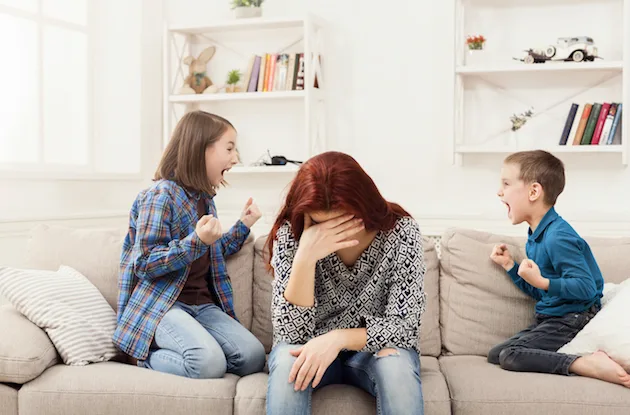How to get your children ready for the real world—while they’re still young
Remember the days when parents figured they’d be done with childrearing by the time their children reached voting age or graduated from college?
Ha! These days, the timeline for becoming a full-fledged, rent-paying, independently living adult has stretched into the mid-20s and beyond for many families. Forbes recently reported that less than half of the population ages 22-26 surveyed pay their own rent (47 percent), health insurance (41 percent), or contribute to a retirement account (27 percent). Just surveying the proliferation of YouTube videos and other instructional content on the web detailing how to cook an egg, do one’s laundry, and accomplish other everyday tasks, it’s clear there’s a need out there for basic life-skills instruction.
It’s fondly known as “adulting,” and UrbanDictionary.com describes it this way: “Adulting (v): to do grown-up things and hold responsibilities such as a 9-5 job, a mortgage/rent, a car payment, or anything else that makes one think of grown-ups.”
It’s not the worst thing in the world to have your kids living at home longer. But it is important for them to acquire basic life skills along the way, so whether they are living with you or on their own they can cook their own dinner and wash their own clothes. Experts say how we raise our kids can make or break their ability to run their own lives as they age out of their adorable phase and grow into adulthood. We asked experts for their best tips on how, when, and why to prepare your kids practically and emotionally to be grown-ups.
Act like an adult
Parents must be role models for grown-up behavior. “Your children are watching you even when you think they aren’t paying attention,” says developmental psychologist Martha Mendez-Baldwin, Ph.D., an assistant professor of psychology at Manhattan College in the Bronx. “They pick up a tremendous amount of information about your value system and your patterns of behavior simply by watching you.” As our children’s first teachers, we can impart skills necessary for them to function in life as productive members of society, she says. “This includes life lessons about respect, accountability, hard work, perseverance, and emotional regulation.”
Be authoritative
Parents often struggle with the balance between being loving and being the boss, but firm guidance is essential. “Authoritative parents are emotionally and physically available but are not their child’s pal or friend,” Dr. Mendez-Baldwin says. “There are clear boundaries and rules and expectations are enforced consistently.” Authoritative parents can listen to their children’s opinions and respect their feelings and encourage communication and family time, she adds. On the flip side, pushing kids too hard toward specific achievements can backfire.
Plant the seeds of self-esteem early
A healthy sense of self is one of the keys to healthy adulting. “Without self-esteem children will be ill prepared to navigate the world of decisions and social dilemmas that await them as they voyage through adolescence and into adulthood,” Dr. Mendez-Baldwin says. In addition to life skills, parents should start molding their child’s self-esteem as early as possible, she advises. Begin as early as age 2, when kids begin to test the limits of their independence.
Stop helicopter parenting
It is natural to want to protect your child from negative events and emotions because you don’t want to see him hurt or experience a blow to his self-esteem. “But we live in a world of positive and negative, good and bad,” says Angela Reiter, Ph.D., who offers therapeutic services and psychological evaluations in Eastchester. “In order to know how to handle the negative and appreciate the positive in life, we have to actually experience the negative and learn from it, in order to develop a sense of self-efficacy and a positive self-schema of what we can do when faced with a similar situation or emotion the next time it comes around.”
Let them feel disappointment
Lindsey Cormack, Ph.D., of Stevens Institute of Technology, College of Arts and Letters, in Hoboken, NJ, is a parent of a 4-year-old and a professor to students ages 18-22. “With my own child, I try to let her experience letdown,” she says. “For instance when a playdate is cancelled, I find that I have an urge to protect my child from sadness by offering an alternative, like a date with me.” She refrains from trying to fix it and instead helps her daughter through a lesson in knowing that sometimes things don’t work out, and sadness is OK. “I think letting children experience and understand letdown in the small forms of childhood may better prepare them for the relatively larger let downs of their college years, such as bad grades on an assignment, non-admittance to certain schools and programs, and more,” she adds.
RELATED: The Benefits of Failure
Allow kids to develop naturally
Parents and teachers often underestimate when children are capable of doing activities on their own, and we may inadvertently slow down their natural reflexes to deal with the world around them, says parenting coach Jesse McCarthy, a former school principal and Montessori educator. “As adults, we can infantilize children from the very beginning, when they’re infants,” she says. “A toy rattle might—seemingly—be just out of the reach of a baby girl, and instead of letting her struggle a bit to reach it, we almost instinctually help her by placing the toy in her hands.” She points out that we forget that with children, sometimes the process of striving for a toy is just as important as the result of playing with the toy. It’s a metaphor for the older years, when we still tend to do more for our children than they need, making them accustomed to having things “handled” for them in life.
Create environments that foster independence
Avoid “an unintentional breeding of dependence” as kids continue to grow, McCarthy says. “Our children are fully capable of all sorts of independent activities, when we prepare the environment for their success.” For example, when child-sized shelves with cups and a movable stool are within 5- and 6-year-olds’ reach, they don’t have to ask an adult for help just to get a drink of water from the sink. Show 8- and 9-year-olds how to do the laundry, and mom and dad are no longer needed for that process afterward. Let 11- and 12-year-olds walk to school to learn to navigate the streets and the world around them. Trust teenagers not to burn the house down and leave them alone for short periods of time. She points out that little steps toward independence at every stage prepares kids while doing everything for them stunts their development.
Encourage your child to take on chores
If kids are not given responsibilities, it will be hard for them to learn responsibility. “Assign children age-appropriate chores and praise them when they are completed,” says Deena Blanchard, M.D., M.P.H., a board-certified pediatrician at Premier Pediatrics in Brooklyn. “Part of this process may involve parents letting children experiment and find the best way to complete the chore.” As parents, it’s challenging to let go of some of the control but it is important to let children figure out their way to do it, which may not be exactly the same as yours, she says. “If a child feels they accomplished the chore their way and on their own, they will be more likely to feel a sense of pride and responsibility for that task and continue to do it.”
Show them how to manage money
Earning, managing, and saving money is key to adulting, so give kids a sense of financial reality and ownership early, starting with a home savings bank to get them thinking about acquiring and managing income early. “Get them a bank account and stress saving for the future rather than rushing out to spend their money without giving it thought,” advises Laurie Hollman, Ph.D., a psychoanalyst specializing in infant-parent, child, adolescent, and adult psychotherapy and author of Unlocking Parental Intelligence. Also, having them write checks and pay bills is a good lesson for the future.
Have them invest time and money in others
Vivian Glyck encouraged her son Zak to forgo gifts and divert his bar mitzvah money to a special online fund that was used to build a much-needed library at the Namunia Primary School in Luwero, Uganda. The fundraiser was also opened to the public, and he raised $10,000, but it wasn’t meant as just a charitable exercise. “This was about giving him a connection to the world,” says Manhattan-born Glyck, founder of the Just Like My Child Foundation, which runs many humanitarian programs in Africa. “It was about having an impact on someone’s life.” She recently took him to see the outdoor structure with books that was built by his good deed. It’s called Zak’s Library. Local children gathered around to thank him. In that moment, Glyck said to her son: “How much bigger is this than having $1,000 in your savings account?” It was a good life lesson in sacrificing his needs for a greater outcome.
RELATED: Where to Volunteer with Kids
Don’t make excuses for your children
It may be hard to watch them flounder and flail through life experiences, but accountability is a building block toward behaving like an adult. “Let children get out of their own messes, unless they are in real danger,” says parenting and relationship expert Thomas Gagliano, author of The Problem Was Me and his newest title, Don’t Put Your Crap in Your Kid’s Diaper: The Clean Up Cost Can Last a Lifetime. “Don’t call into school if their excuse for not going to school is a lie. Let them call in for themselves. Let them face life on life’s terms. No bailouts. Always be there to talk to them or guide and support them, but let them be responsible for their own actions.”
Teach children their choices affect outcomes
Encourage independent choices but hold kids accountable for their decisions. “If you don’t put your toys away, then you choose not to play with your toys later,” Gagliano says. “If you choose to not clean your room, then you choose to not get your allowance. If you choose to come home past the curfew we have agreed upon, then you have chosen to not go out this weekend.”
Consider a more limited life menu
Providing children with too many choices can open them to life’s possibilities but can also be overwhelming. Opening all of life’s doors for them can also present a false sense of reality about what the real world is like when they get there. “Having many choices is a double edged sword,” Dr. Mendez-Baldwin says. “While it creates many opportunities for children, it also requires decision making and problem solving. Children who do not have a healthy sense of self-esteem, children who are insecure, and children who do not have a trusted adult to talk to will have trouble making the right choices.”
RELATED: Help Children Become Good Decision Makers
Give them age-appropriate freedom
The amount of freedom given to a child must be a good fit between their age and their personality. “A 5-year-old may have freedom to choose a Halloween costume or choose between two snacks to pack in their lunch box but cannot choose their bed time,” Dr. Mendez-Baldwin says. “Keep in mind that children develop at slightly different rates. For example, two 16-year-olds many not be able to handle the same amount of freedom.” She points out that appropriate levels of freedom will allow children to make decisions and start to gain confidence in their decision-making process while still having you around to support and guide them in areas where parental assistance is still required. “If parents control too much of a child’s life, children tend to rebel and often will make poor decisions because they have had no practice in this important life skill.”
Coach them on planning for the future
Having kids think about goals is healthy and helpful. “Let them establish a timeline even if it’s tentative and will change with new experiences,” Dr. Hollman says. “Encourage them to think about where they want to be in two years, five years, 10 years, and beyond.” Just make sure this is an exercise in creating the life they choose, not a stressful mandate for achievements.
Let them see news
We may be tempted to shield their eyes and ears but learning about current events, problems in the world, and differing points of view is an important part of growing up. “We can’t protect them from everything,” says parenting expert and blogger Cherie Corso. She watches the news and reads the newspaper with her young daughter and discusses events, something she recommends for kids older than 6. Just skip the graphic details and images, answer their questions, and explain some of the more complex issues. “When explained, kids can logically think about events and they do have opinions and it’s great to discuss and hear what they think,” Corson says. “News and information is now 24/7. The greatest gift you can give your children is to teach them the tools to process it.”
Don’t let them adult too fast
On the flip side of kids struggling to grow up are those who try to fast track to adulthood. They also need a little help. “Children who are inherently more responsible may try to take on roles of taking care of everything for various people in their lives,” Dr. Blanchard says. “These children may feel the pressure to do “the right” thing all the time. While this is a good character trait, it can sometimes lead to children to being taken advantage of by peers or having trouble saying no.” She says to especially teach tweens and adolescents that sometimes saying no is actually the right thing to do and that being responsible is not about always trying to make everyone happy.
Be patient
Give kids space to find their way on their own time. “Not every child will be able to accept independence and responsibility in the exact time frame you would like,” Dr. Blanchard says. “Some children will take longer to be able to do chores that other children in their age group can do. Try not to compare your child to their peers or scold them if they really can’t do something. Praise them when they are doing a good job and praise the process of trying as well.”
RELATED: Need weekend plans?





















